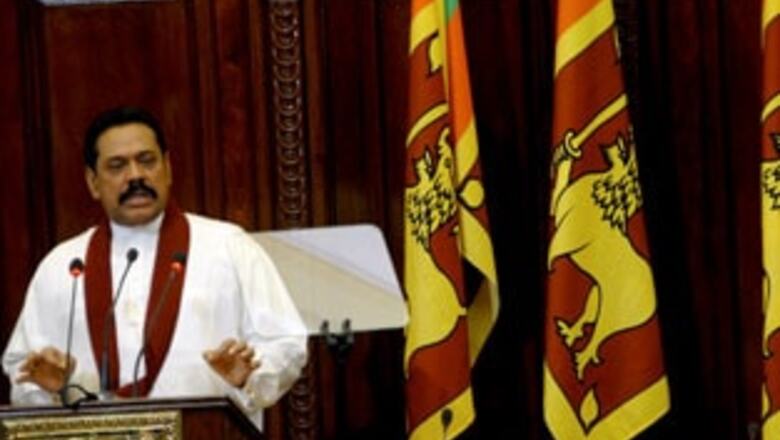
views
Colombo: With a quarter-century civil war in the history books, Sri Lankan President Mahinda Rajapaksa will now put to the test his theory of using a military victory over terrorism as the first step to tackling its root causes.
Flush with the success of victory over the Liberation Tigers of Tamil Eelam (LTTE) in a 25-year war once dubbed unwinnable, Rajapaksa offered compromise and reconciliation with the Tamil minority in a victory speech on Tuesday.
"At this victorious moment, it is necessary for us to state with great responsibility that we do not accept a military solution as the final solution," said the President, who is Sinhalese.
"It is necessary that we give these people the freedoms that are the right of people in all others parts of our country,” he added.
In a nation scarred and divided after one of the world's longest-running and bloody civil wars, with extremists on both sides often calling the shots, Rajapaksa, 63, now faces what may be Sri Lanka's greatest post-independence challenge. It is a one that traces its roots back to 1948, the year Sri Lanka's minority Tamils lost their favoured status as the British colonial government handed power to the Sinhalese majority at independence.
Tamils suffered abuses and sidelining by several governments, which sparked political violence in the 1970s and a full-scale civil war in 1983.
Good Sentiments
"We have seen good sentiments in the past. What matters is the substance of the political settlement," Rajan Hoole, a member of the University Teachers for Human Rights (Jaffna) group that has been equally critical of past LTTE and government abuses.
Delivering political empowerment to the Tamil minority, while balancing the need of security to ensure Tamils do not again turn to violence and suicide bombings, are the keys to success.
One lingering effect of the war that rubs the old wounds raw are the repeated security checks Tamils face in their daily lives. Outgoing US Ambassador Robert Blake, in his final press conference on Wednesday before leaving the island, said Sri Lanka would have to work hard to make everyone feel equal.
"To achieve the promise of this new beginning and to ensure a lasting end to terrorism, bold actions are needed now to share power and to assure all of Sri Lanka's communities a future of hope, respect and dignity," he said.
PAGE_BREAK
Re-establishing Freedom
The war bred a whole new layer of problems on the island, mainly a culture of impunity that allowed murder and violence to become the ready tools of politics over the course of the insurrection.
The Tamil Tigers seized control of the Tamil cause by killing those who opposed their absolutist vision of a separate nation for Tamils, and Sinhalese extremists have killed those who spoke of compromise or against the war effort.
"As everyone says, there must be a political settlement along federal lines, but it must first involve removing the climate of impunity and allowing free political activity," Hoole said.
Dissent Stifled
Critics have accused the government of ruthlessly stifling dissent in the name of fighting terrorism. To answer that criticism, Rajapaksa has already pledged elections in northern Sri Lanka as soon as possible. One complicating factor is that most of the area's residents, more than 250,000, are now in refugee camps after the army's final offensive to crush the LTTE.
The President says he will have all of them resettled by the end of this year. While that happens, Sri Lanka's army will be deployed throughout the area and the army's commander, General Sarath Fonseka, has said they will be employed in demining, clearing hidden weapons stocks and helping reconstruction.
Fonseka and Defence Secretary Gotabaya Rajapaksa both studied US counter-insurgency strategy and have told Reuters they will employ the "winning hearts and minds" strategy that entails in the post-war period.
"I think that is to a certain extent what the Sri Lankans have done. It all boils down to what you do after the shooting stops. Success will be in how well they handle it in terms of reconciliation and rebuilding," said head of Pacific Strategies and Assessments risk consultants in Manila, Scott Harrison.
The President's pledge to bring a "Northern Spring" of redevelopment, reconstruction and investment to the former LTTE area dovetails with the military post-war strategy. To pay for it, he is counting on foreign reconstruction money, which could get entangled in rising Western calls for a probe into human rights and war crime violations in the final offensive.




















Comments
0 comment